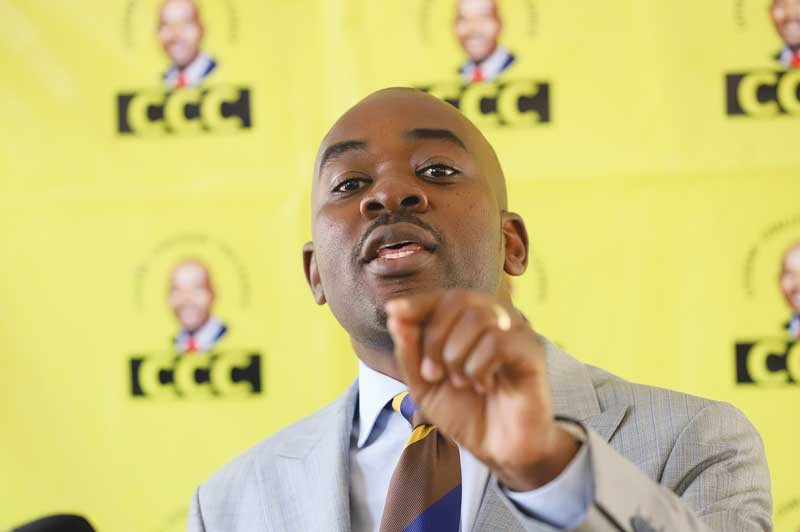Chamisa denies backdoor talks with Mnangagwa

Nelson Chamisa
Opposition Citizens Coalition for Change (CCC) leader Nelson Chamisa has dismissed speculation that he is secretly negotiating with President Emmerson Mnangagwa to resolve the political and economic crisis in Zimbabwe.
Chamisa said the last time he had any contact with the Zanu PF leader was in 2018 when he visited the late Morgan Tsvangirai at his Harare home.
Tsvangirai, who was Chamisa’s mentor and predecessor as the leader of the Movement for Democratic Change (MDC), was battling cancer at the time.
Chamisa said he had not spoken to Mnangagwa since then, despite the repeated calls by regional and international actors for dialogue between the two main political rivals in the country.
He said Zimbabwe needed a genuine and inclusive national conversation to address the deep-rooted challenges facing the nation, such as human rights violations, corruption, poverty, unemployment, inflation, and Covid-19.
“The future of Zimbabwe is predicated on conversation, not only in the context of the media or those that consume media products, but also in the context of politics and how we transact our societal engagements,” he said.
“It is good to dialogue, it is good to have a conversation. But it has to be sincere, transparent, and based on mutual respect and trust. It has to involve all stakeholders, not just a few elites. It has to be mediated by credible and impartial facilitators, not by those who have vested interests or hidden agendas.”
He was speaking to senior journalists and editors at a meeting organised by the Media Alliance of Zimbabwe in Harare on Friday.
He lamented the capture of national media outlets by Zanu PF and said there was need to “liberate them from the shackles and manacles of politics” under whose weight they were unable to operate professionally.
He said the public media, such as The Herald newspaper and ZBC television and radio stations, were being used as propaganda tools by the ruling party and were denying him and other opposition voices a fair coverage.
He also accused some private media outlets, such as The Patriot newspaper, which is linked to the Central Intelligence Organisation (CIO), of peddling lies and misinformation about him and his party.
“You see you can hardly distinguish between The Herald and The Patriot and that is not desirable. The Herald must be a national newspaper and must be seen as such. It must serve the public interest, not the partisan interest. It must inform, educate, and entertain the people, not misinform, indoctrinate, and manipulate them. It must uphold professional standards of journalism, not stoop to low levels of propaganda,” he said.
“That is critical and I can say that is an area of discomfort to us. We want a level playing field in the media space. We want a media that is free, independent, diverse, and accountable. We want a media that promotes democracy, human rights, peace, and development. We want a media that reflects the diversity of opinions, cultures, and perspectives in our society.”
Chamisa said it was important for journalists to have their own self-regulating body just as other professions did.
“There has to be a voluntary media council of the profession. All professions including lawyers, engineers, nurses, doctors, accountants, all of them have profession councils that regulate their members and their activities,” he added.
“I think journalists are the only ones that are suspected, that are not trusted to the extent that they are not given that opportunity to have a Bill that allows them to self-regulate.
“Yes, the government will come in here and there with checks and balances, but the law has to be there allowing journalists to regulate themselves. The government should not interfere with the editorial independence or autonomy of the media. The government should not harass or intimidate journalists or media houses for doing their work. The government should respect and protect the rights and freedoms of journalists and media houses as enshrined in our constitution.”
Chamisa said no election could ever be deemed credible, free and fair in the absence of a free, non-partisan and independent media.
He said he was preparing for the next election in 2023 but he had no confidence in the electoral system or institutions in Zimbabwe.
He said he still disputed the outcome of the 2018 election which he claimed was rigged by Zanu PF with the help of the Zimbabwe Electoral Commission (ZEC) and the courts.
He said he wanted electoral reforms that would ensure transparency, accountability, and integrity in the electoral process.
He said he also wanted security sector reforms that would ensure that the army and other security agencies remained neutral and professional in their conduct.
He said he wanted constitutional reforms that would limit presidential powers and enhance parliamentary oversight.
He said he wanted economic reforms that would end corruption and mismanagement of public resources and create opportunities for growth and development.
He said he wanted social reforms that would improve access to quality education, health care, water, electricity, housing, transport, and other basic services for all Zimbabweans.
He said he wanted political reforms that would foster dialogue, tolerance, reconciliation, and unity among Zimbabweans.
While differences were inevitable in societies, Chamisa said it was important for a nation to try to unite and work together for the good of the country.
“Differences happen but we have to find each other. We are a great country, but that greatness is dwarfed by divisions, and by toxicity,” he said.
“We hope that the press will play a pivotal role to lubricate our poisoned environment and make sure there is more light in it than darkness.”
–Standard




